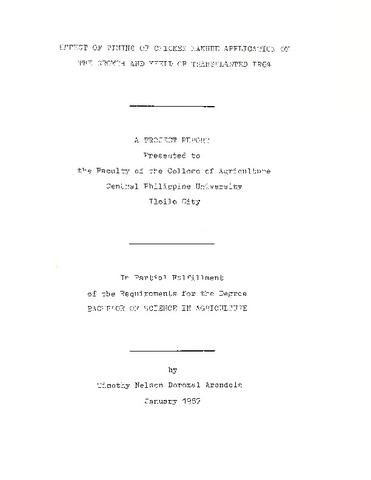Effect of timing of chicken manure application on the growth and yield of transplanted IR64

Page views
1,516Дата
1987-01Thesis Adviser
Defense Panel Chair
Share
Metadata
Показать полную информацию
Аннотации
This study was conducted from September 19, 1985 to January 11, 1986 at the experimental field of the Crops Research Laboratory, College of Agriculture, Central Philippine University, Jaro, Iloilo City, to determine the best time of applying chicken manure and to determine the effect of chicken manure on the growth and yield of transplanted IR64 rice.
A total land area of 130.35 square meters was divided into three blocks, each block representing a replication. Each replication was further divided into four plots, each one having a. dimension of 2 x 4 meters. Each plot was fertilized with inorganic fertiliser in combination with chicken manure. The chicken manure were applied 4, 3, 2 and. one week before transplanting to supply 30 kg of nitrogen per hectare. The plots were fertilized with inorganic fertilizer materials using ammonium sulfate end muriate of potash one day before transplanting. Last application of inorganic fertilizer using ammonium sulfate was done 42 days after transplanting. All plots received an equivalent of 60-0-45 kg N, P2O5 and K2O per hectare, respectively, coming from "both organic and, inorganic sources. The experimental treatments were arranged in a, randomized complete block design replicated three times.
The results showed that the different timing of chicken manure application did not significantly affect plant height in all growth stages of the rice plant. Similarly, tiller count in all stages of growth except at 2 weeks after transplanting were not also affected.
Furthermore, the different timing of chicken manure application did not significantly affect the number of days from transplanting to flowering, weight of grains per panicle end weight of unfilled grains per hill. On the contrary, however, the weight of filled grains per hill was significantly affected by the different timing of chicken manure application at the 5 percent level of probability. Accordingly, the heaviest weight of filled grains was obtained from plants applied with chicken manure 4 weeks before transplanting, which was comparable to that obtained from plants applied with chicken manure 2 weeks before transplanting. These were significantly higher to the weight of filled grains obtained from plants applied with chicken manure 3 weeks before transplanting. The lowest was obtained from rice plants supplied with organic fertilizer one week before transplanting.
Yield of 90.03 cavans per hectare was observed from plots fertilized with chicken manure 2 weeks before transplanting. This yield was significantly more over the yield of plots fertilized 4, 3 and a week before transplanting which were 78.45, 75.76 and 71.94 cav/ha, respectively.
The return on investment analysis of the results revealed that for every peso invested a corresponding 4.63, 3.75, 3.28 and 3.50 return was obtained by applying chicken manure 2, 3, 4 and a week before transplanting, respectively.
Based on the results, the researcher recommends the application of chicken manure at two weeks before transplanting for maximum returns.
Описание
Full text available (with author's permission)
Suggested Citation
Arandela, T. N. D. (1987). Effect of timing of chicken manure application on the growth and yield of transplanted IR64 (Unpublished project report). Central Philippine University, Jaro, Iloilo City.
Type
Special paperТематика
Department
College of AgricultureDegree
Bachelor of Science in AgriculturePhysical Description
xi, 57 leaves

